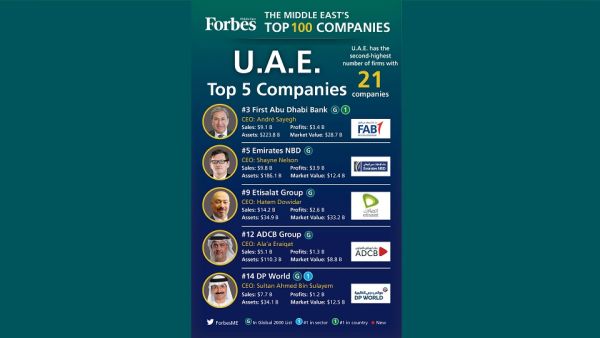21 UAE Companies Among the Top 100 in the Middle East, but Saudi Aramco Dominates at #1

Forbes Middle East has unveiled its list of the Middle East’s largest and most successful listed companies for 2020. The ranking is compiled from in-depth research based on data from all stock exchanges in Arab countries and analysis of market value, sales, assets, and profits.
The highlight of this year’s list is the arrival of Saudi Aramco, making its debut in first place. The oil giant is currently the most valuable company in the world with a market value of $1.6 trillion. The 100 companies have a total of $670 billion in sales, $148 billion in net profits, $3.5 trillion in assets, and $2.3 trillion in market value—but Saudi Aramco represents 49% of those total sales, 59.6% of the net profits, and 69.6% of the market cap.
Without considering Aramco’s numbers, profits dropped to $60 billion for 2019, down from $70.1 billion the year before—a drop of 14%, even before the coronavirus pandemic hit. Sales were up marginally to $340 billion—a $4 billion increase year-on-year. Due to the coronavirus pandemic, the market values of the companies have also taken a hit, dropping 26.8% from $945 million to $691 million, excluding Saudi Aramco.
Saudi Arabia, the region’s largest economy, dominates the list with 33 entries, followed by the UAE with 21 companies and Qatar with 18 companies. GCC countries make up 90% of the list, with Kuwait and Bahrain having seven companies each on the list and Oman having four. Among the north African countries, Egypt has five companies on the list and Morocco has four. Only one Jordanian company made the list. No Lebanese companies feature on the list as none disclosed their financial statements before 23 April 2020.
With 46 companies’ banks make up almost half of the list, followed by companies in the industrials sector with nine entries, followed by telecom and real estate with eight entries each.
“Although the pandemic has sadly led to the closure of some companies, it has also opened doors of opportunity and growth for others,” said Khuloud Al Omian, Editor-in-Chief of Forbes Middle East. “While the market value of many the companies on our list has dropped, they are still showing great resilience and continuity in difficult times.”
Background Information
Forbes Middle East
Forbes Middle East has a license for copy rights and distribution rights in the MENA region from Forbes Media, U.S.A. Under the guidelines standardized amongst all Forbes titles, the magazine features analysis and expert reporting related to the finance and business world, as well as investment opportunities in the Arab region. Forbes Middle East puts together its lists based on the criterion of neutrality, authenticity, commitment to the methodology of scientific research, and the quality of standards set globally by Forbes through its extensive experience in this field.
Forbes Middle East also serves as a guide for businessmen and decision makers by providing them with information and statistics necessary for making the right decisions. Thus, the magazine becomes the guiding compass for investments in the region. Through its wide network of press correspondents the magazine also works toward covering all the economic fields and issues concerning the Arab region.






